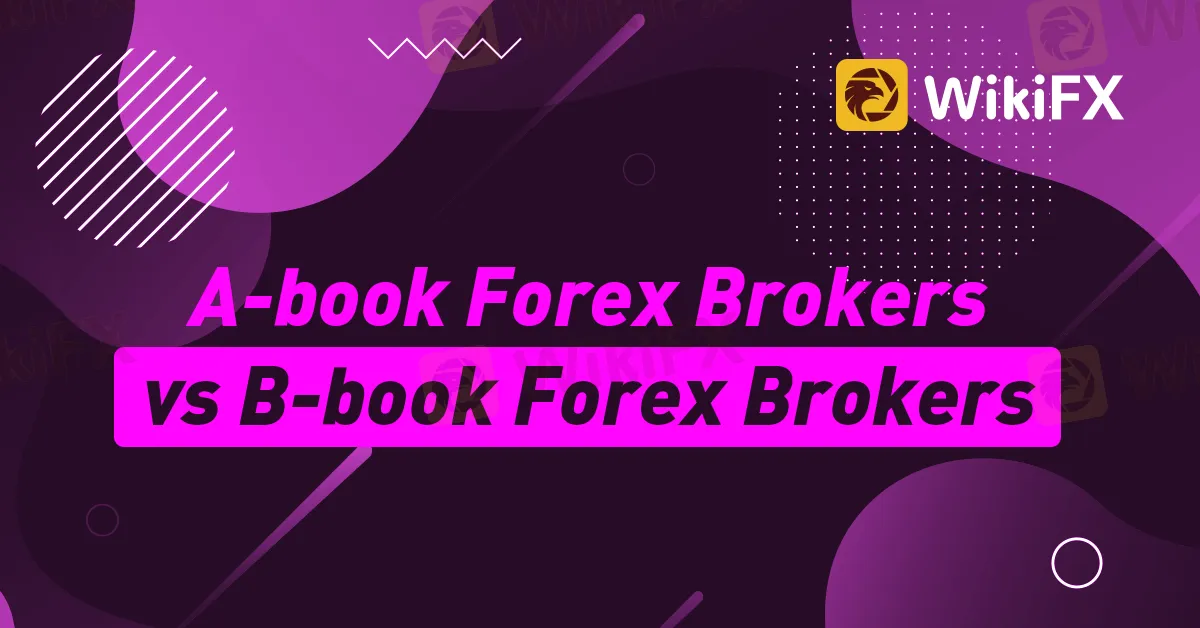简体中文
繁體中文
English
Pусский
日本語
ภาษาไทย
Tiếng Việt
Bahasa Indonesia
Español
हिन्दी
Filippiiniläinen
Français
Deutsch
Português
Türkçe
한국어
العربية
A-book Forex Brokers vs B-book Forex Brokers
Abstract: In the forex world, you may see some brokers called "A-book" and others called "B-book" brokers. In this article, we will analyze what these two types of brokers are and what the differences look like.

About A-book and B-book
To understand what A-book and B-book brokers are, we must first understand A-book and B-book. A-book and B-book refer to the way that brokers distinguish and separate their clients based on the degree of risk associated with each clients order. There is no exclusive A-book forex brokerage or B-book forex brokerage.
About A-book forex brokers and B-book forex brokers
These are the forex brokers that routinely pass on their clients‘ orders for fulfillment in the interbank market or other external execution venues. They could sum up the traditional definition of a brokerage: they source the liquidity for their clients’ orders and pass these orders on for other entities to fulfill. They act like facilitators of these transactions. The closest brokerage model to the A-book forex brokerage model is the STP brokers. However, this is not to say that market makers do not routinely carry out A-book order fulfilments.
Now, what about the B-book forex brokers? As you may have guessed, the market makers always have the B-book system in operation. Remember the 95% of traders who are not usually profitable as forex traders? Well, these are the traders lumped into the B-book liquidity bucket for in-house order fulfillment by the brokers dealing desk. The B-book forex brokers routinely use their in-house dealing desks to fulfill such orders, usually by taking a counterparty position to the trades of these clients.
Difference between the two
The difference between the A-book and B-book forex brokerage model is pretty simple. The A-book utilizes interbank market executions for clients orders, while the B-book process leads to internal order fulfillment without the usage of the interbank market.
A-book: You are trading with the banks and you have various options at transparent pricing. The broker provides the software and access to the interbank market.
B-book: You are trading with the supposed facilitator.

Disclaimer:
The views in this article only represent the author's personal views, and do not constitute investment advice on this platform. This platform does not guarantee the accuracy, completeness and timeliness of the information in the article, and will not be liable for any loss caused by the use of or reliance on the information in the article.
Read more

March Oil Production Declines: How Is the Market Reacting?
Oil production cuts in March are reshaping the market. Traders are closely watching OPEC+ decisions and supply disruptions, which could impact prices and future production strategies.

How to Calculate Leverage and Margin in the Forex Market
Leverage amplifies both potential profits and risks. Understanding how to calculate leverage and margin helps traders manage risks and avoid forced liquidation.

RM1.29 Million Lost in ‘C Baird VIP’ WhatsApp Scam
A 43-year-old company auditor and subcontractor in Malaysia became the latest victim of an elaborate investment scam after losing RM1.29 million to a fraudulent scheme promoted via WhatsApp.

U.S. March ISM Manufacturing PMI Released
The U.S. March ISM Manufacturing PMI data shows that manufacturing has contracted for the first time, and investors should pay attention to future changes and impacts on the sector.
WikiFX Broker
Latest News
The Withdrawal Trap: How Scam Brokers Lure Victims into Paying More
FCA to Investors: Think Twice Before Trusting These Brokers
Trump\s tariffs: How could they affect the UK and your money
Trump gambles it all on global tariffs he\s wanted for decades
TradingView Brings Live Market Charts to Telegram Users with New Mini App
Trump tariffs: How will India navigate a world on the brink of a trade war?
IG Group Acquires Freetrade for £160M to Expand UK Investment Market
U.S. March ISM Manufacturing PMI Released
Should You Beware of Forex Trading Gurus?
Exposed by SC: The Latest Investment Scams Targeting Malaysian Investors
Currency Calculator







